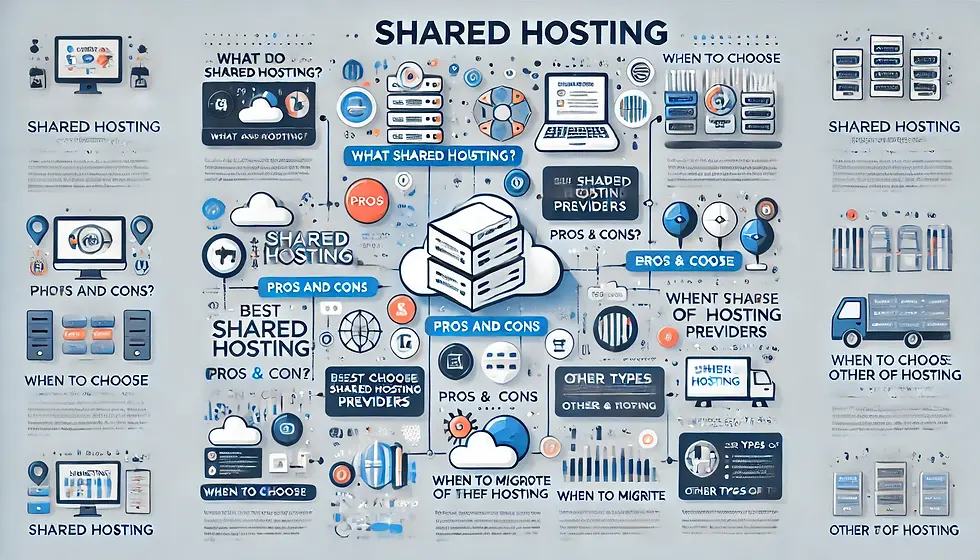All About Shared Web Hosting
- Webhosting atoz
- Jul 27, 2024
- 3 min read
Updated: Jul 28, 2024

When it comes to hosting your website, shared hosting is often the go-to option for many beginners and small businesses. This comprehensive guide will walk you through everything you need to know about shared hosting, including its pros and cons, the best shared hosting providers, their main features, and when you should consider migrating to other types of hosting.
What is Shared Web Hosting?
Shared hosting is a web hosting service where multiple websites share the same physical server and its resources. It’s like living in an apartment building where you have your own space but share utilities and common areas with other residents. This setup allows hosting providers to offer services at a lower cost since the expense of the server is split among multiple customers.
Pros and Cons of Shared Web Hosting
Pros:
Cost-Effective: Shared hosting is generally the most affordable option, making it ideal for small businesses, personal blogs, and startups.
User-Friendly: Many shared hosting plans come with user-friendly control panels like cPanel or Plesk, making it easy to manage your website.
Maintenance and Management: The hosting provider handles server maintenance, security updates, and technical support, allowing you to focus on your website content.
Cons:
Limited Resources: Since you’re sharing resources with other websites, high traffic on one site can affect the performance of others.
Less Control: You have limited control over server configurations and settings.
Security Risks: Sharing a server with multiple websites can pose security risks. If one site gets hacked, others on the same server may also be vulnerable.
Best Shared Hosting Providers and Their Main Features
-Bluehost:
Main Features: Free domain for the first year, 24/7 support, one-click WordPress installation, free CDN (Content Delivery Network).
Why Choose: Excellent customer service, recommended by WordPress.org, user-friendly interface.
Main Features: Unmetered bandwidth, free website and domain transfer, 24/7/365 support, 45-day money-back guarantee.
Why Choose: Affordable plans, scalable options, robust performance.
Main Features: Free daily backups, managed WordPress hosting, SSD storage, free SSL certificates.
Why Choose: Renowned for speed and security, excellent customer support, strong uptime.
Main Features: Free domain, free SSL, unlimited email accounts, SSH access.
Why Choose: Top-notch technical support, reliable performance, extensive feature set.
When to Choose Shared Hosting
Shared hosting is a great option if:
You’re a Beginner: If you’re new to website management, shared hosting offers an easy-to-use and affordable entry point.
You’re on a Budget: Shared hosting is cost-effective, allowing you to allocate funds to other aspects of your business or project.
Your Site Has Moderate Traffic: If your website doesn’t attract huge amounts of traffic, shared hosting can efficiently meet your needs.
When to Migrate to Other Types of Hosting
As your website grows, you might outgrow shared hosting. Here are some signs it’s time to migrate:
Increased Traffic: If your website is experiencing significant traffic spikes, you may need more resources and better performance.
Performance Issues: Slow loading times and frequent downtime can indicate that your shared hosting plan is no longer sufficient.
Need for Customisation: If you require more control over server settings and configurations, it’s time to consider upgrading.
Other Types of Hosting
VPS (Virtual Private Server) Hosting:
Overview: Provides a dedicated portion of a physical server's resources, offering more control and better performance.
Ideal For: Growing websites that need more resources and customization options.
Dedicated Hosting:
Overview: You get an entire physical server dedicated to your website, offering maximum control, performance, and security.
Ideal For: Large websites, high-traffic sites, and those needing complete control over server settings.
Cloud Hosting:
Overview: Uses a network of virtual servers to host websites, providing scalability, reliability, and flexibility.
Ideal For: Websites with fluctuating traffic and those needing high availability and redundancy.
Managed WordPress Hosting:
Overview: Optimised for WordPress sites, offering automatic updates, security enhancements, and specialised support.
Ideal For: WordPress users looking for hassle-free management and enhanced performance.
We will cover all these options in future blogs, and go through the advantages and disadvantages of each of them. We will also cover how to select the right provider and analyse some of them, their features and pricing policy, which might help decide which of them could be the right match for you... stay tuned!!
Conclusion
Shared hosting is a fantastic starting point for many websites, offering affordability, ease of use, and managed services. However, as your website grows, you may need to consider other hosting options like VPS, dedicated, cloud, or managed WordPress hosting to meet increased demands and performance requirements. Understanding your hosting needs and knowing when to upgrade will ensure your website remains efficient and effective as it scales.

Comments